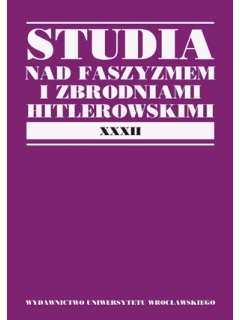

Artykuły

POLISH NATIONAL SOCIALIST MOVEMENT IN THE THIRTIES OF THE TWENTIETH CENTURY
During the fourth decade of the 20th century new small political parties appeared on the Polish political scene. In their enunciations they defi ned themselves as “National-and-Socialist”. In these organizations National Socialism was understood as social movement of Nationalist character, as a plebeian Nationalism which strongly emphasized the issue of “social justice”. Polish National Socialism developed itself mainly in Southwestern Poland, particularly in Silesia, and in other industrial centers where representatives of foreign capital – especially German and Jewish – were influential. In a situation of a conflict of interests between Polish employees mainly belonging to working class and foreign capitalists, social and national issues were closely intertwined. Therefore Polish National Socialists demonstrated anti-capitalist attitude clearly and emphatically. Usually they propagated central planning in economy which was to remain under governmental guardianship; at the same time they approved of small categories of individual property. Not even the slightest traces of racism or chauvinism can be found in their writings. Judging by the remaining texts and publications – left by members of Polish National-and-Socialist circles – it is clear that their imitation of German National Socialism was very superficial and perfunctory. It did not manifest itself at all as far as religious and axiological beliefs were concerned. The parties’ attention was only drawn by financial and material successes of Germany. The parties described in this article – as far as axiology is concerned – were not much different from other Polish National-and-Catholic formations. This fact makes them fundamentally different from their German National-and-Socialist counterpart. This conclusion is supported by history of some of these formations which – as in a case of NRRU and NSPR – later on united themselves with organizations which evolved from “endecja”. The ideological kinship between “endecja” and National Socialists seems to be the decisive factor stimulating this integration. The last assumption is confi rmed by general evaluation of Polish Nazis which is presented in this article. Four parties are the subject of presentation: National Socialist’s Party PNS, National-and-Socialist Party of Workers NSPR, Polish National-and-Socialist Party PPNS and Radical Movement for Healing RRU.